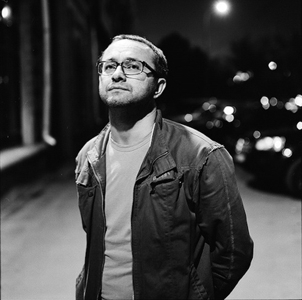A Femme Fatale, In The Rubble Of Perestroika
05/17/2012
Elena (Nadezhda Markina), a dutiful wife to her wealthy husband and a burdened mother to her layabout son, manages to balance the needs of the two, until she learns her husband plans to leave her family nothing in his will.
On its surface alone, Andrey Zvyagintsev's Elena is an intensely compelling slice of noir about moral rot and class warfare in post-Soviet Russia. Deeper down, the movie seethes quietly with the moody influence of other East European masters of the timeless ineffable. If Zvyagintsev were a less inscrutable filmmaker, he might have titled his new film Crime Without Punishment — but we'll get to that.
From the word go, there are subtle signs of discord in the marriage of Vladimir (Andrey Smirnov) and Elena (Nadezhda Markina), a wealthy couple whose domestic life runs on oiled wheels of routine.
He's a self-made businessman in his 60s whose daily trips to the gym keep him spry, disciplined and on the lookout for a well-turned ankle. She's maybe a little younger than he, tall and broad and dowdily dressed like a relic of pre-capitalist peasant stock.
Sure enough, after she's seen to her husband's needs, Elena rides the buses and trains to the dreary suburbs, bringing money and food to her unemployed son and his family. She might as well be traveling to another planet.
Vladimir and Elena met when she nursed him back to health in a hospital, and as his wife, she continues that role, not grudgingly but with a distance that might cover for resignation or resentment. Or perhaps she's patiently biding her time. Physically they make an ill-matched couple, but they seem affectionate enough, treating one another with the tactful respect of two colleagues bound by a mutually beneficial contract.
If you've seen Zvyagintsev's extraordinary 2003 film The Return, a similarly ominous beauty about two young brothers on a fishing trip with their long-absent father, you'll know not to expect exposition, or even much in the way of event.
The dialogue (by Zvyagintsev with Oleg Negin) is spare and functional; the fragmentary score is by Philip Glass, unless you count the portentous caw of crows outside a window to bookend the action. In the background we hear the faint, ceaseless babble of talk shows about dating and the proper way to make sausage.
Elena cares for her husband Vladimir's (Andrey Smirnov) needs in a relationship whose true nature is not entirely clear.
Vladimir and Elena's apartment looks eerily like his gym or the hospital where he recuperates from a stroke. All three form a seamless line of discreet opulence and engineered good taste, unbroken by the warmth of spontaneity, idiosyncrasy or mess.
In fact, a full cauldron of crap bubbles beneath the arid calm. For all their apparent harmony, Vladimir and Elena languish in separate but equal thrall to their children, he to a hedonistic, embittered daughter he rarely sees, she to her indolent lout of a son, who would rather milk his reluctant father-in-law for cash than find a job.
When Vladimirannounces that he's leaving most of his estate to his feckless daughter, Elena is appalled. As in The Return, there follows a shocking act, but it's handled matter-of-factly and without trumpeting transitions, making the crime a continuous part of the movie's broody minimalism rather than its denouement.
The rest is Dostoevsky, amply sprinkled with Tarkovsky, Kieslowski and probably a few other –ovskys I haven't thought of. Beneath the noirish topicality of Elena, which won a special jury prize atCannes last year, lies a bone-deep existential unease and spiritual alienation, a preoccupation with sin that is at once quintessentially Russian and wholly archaic.
Halfway through the movie, the perpetrator of that terrible crime — a monster passing as a saint — enters a church in search of redemption and is brusquely chided for having no head covering. If Zvyagintsev casts a quietly disgusted gaze on what has become of his country after the promise of perestroika, his vision of eternal human frailty is inescapably tragic and religious — and brutally unforgiving. Giving us someone to root for is the last thing on this austere director's mind, and there's something thrilling about such a symphonic view of sin in our bloodlessly psychological age. But the American in me kept holding out for amazing grace.
Ella Taylor
"National Public Radio" (NPR)
